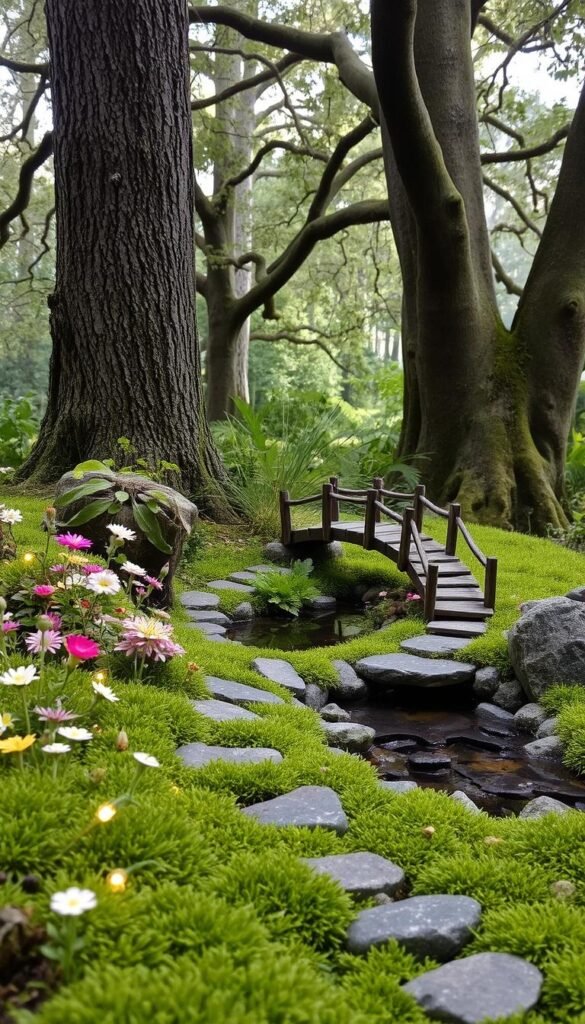Transform your outdoor space into a sanctuary of wonder where everyday stress fades beneath tiny bridges and sparkling toadstools. These charming landscapes blend nature with storytelling, letting you craft scenes straight from storybooks. Whether you’re designing a cozy cottage nook or a mystical woodland path, each creation becomes a portal to simpler joys.
Building these spellbinding displays offers more than visual appeal – it’s therapy for busy minds. Studies show hands-on projects boost creativity by 45%, and families report stronger bonds when collaborating on whimsical landscapes. Children especially thrive, developing problem-solving skills while arranging pebble pathways and miniature furniture.
What makes these gardens truly special? They evolve with you. Swap seasonal accents like autumn leaves or winter berries, or add unexpected treasures from budget-friendly gardening projects. An old teacup becomes a pond, while painted rocks form a magical village square.
Your journey begins with soil and imagination. As you position each tiny detail, you’ll rediscover childhood wonder – and create an evergreen retreat that delights visitors year-round.
Getting Started with Your Enchanted Fairy Garden
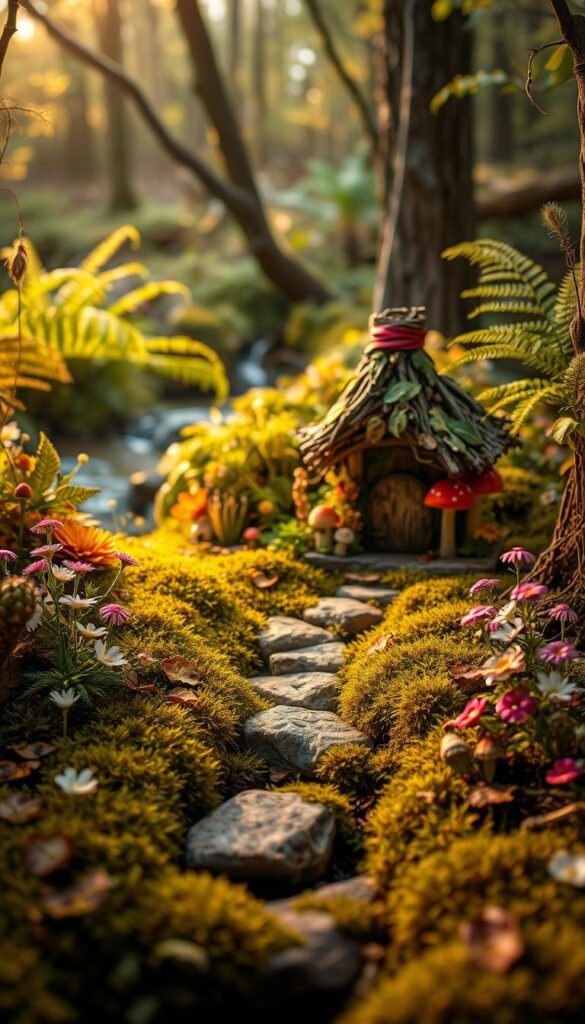
Begin your journey by adopting Tinkerbell’s mindset – every ordinary object holds hidden magic. Your adventure starts not at a store, but in forgotten corners of your home where potential treasures await transformation.
Gathering Materials and Upcycling Ideas
Turn scavenger hunts into creative sessions. That chipped teacup becomes a cozy cottage when placed sideways. Wine corks morph into mushroom stems when paired with painted bottle caps. Keep an eye out for:
- Craft sticks for miniature fences
- Old jewelry for sparkling pathways
- Recycled bottles as quirky planters
Thrift stores become goldmines for unique materials – a cracked saucer makes the perfect pond liner. Even kitchen drawers hide possibilities, like measuring spoons repurposed as garden tools. For more inspiration, explore DIY garden art techniques that transform everyday objects.
Planning Your Whimsical Layout
Sketch your vision considering three key factors: sunlight patterns, water drainage, and visitor access. Create zones for different activities – a pebble plaza here, a mossy meeting spot there. Leave breathing room between elements so plants can grow naturally.
Maintain consistent scale by using a penny as reference – doorways should appear 2-3 times taller than your smallest fairy figurine. Cluster taller items at the back to create depth, making your space feel larger than it appears.
Embracing a Budget-Friendly Approach to Fairy Gardens
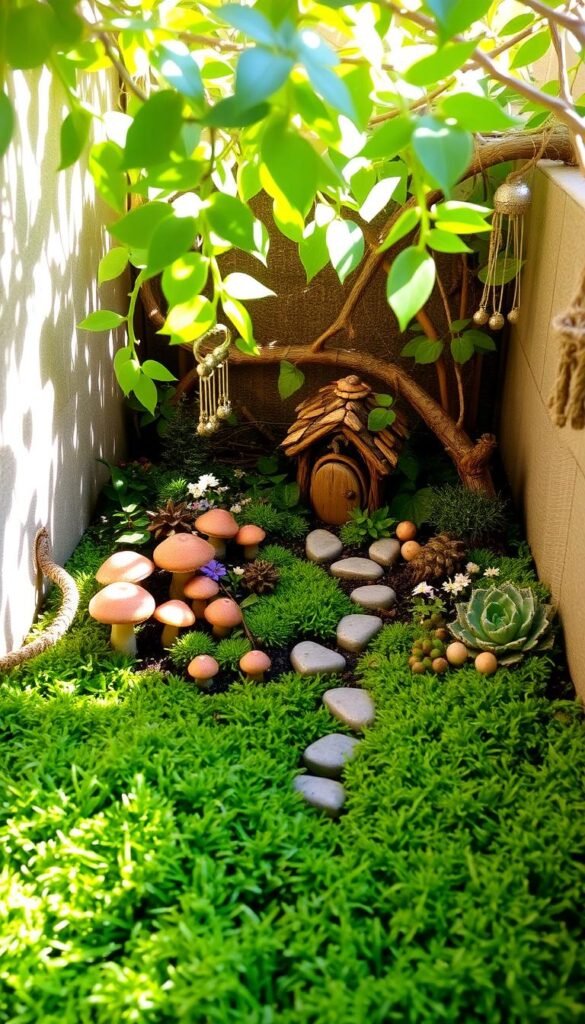
Unlock the magic of miniature worlds without emptying your wallet by seeing potential in everyday objects. That mismatched button? A perfect stepping stone. Cracked eggshell halves? Ideal fairy bathtubs. This resourceful way of building lets your family bond while teaching kids that wonder thrives in simplicity.
Inspired by Tinkerbell’s Creative Touch
Channel Tinkerbell’s knack for repurposing “lost things” into functional magic. Transform:
- Old silverware into arched bridges
- Broken terracotta pots into cottages
- Marbles as mystical pond orbs
These character-filled creations often outshine store-bought pieces. A juice lid becomes a gazing pool when filled with resin, while twine-wrapped jars make charming lanterns. Unlike delicate purchased accessories, your upcycled treasures withstand rain and frost.
Turn material hunts into adventures. Search backyard for pinecone roofs or beach pebbles for pathways. Kids learn environmental responsibility while spotting potential in “trash.” The real magic? Memories made when transforming a bottle cap into a tiny café table outweigh any price tag.
This approach frees you to experiment. Paint rocks as storybook characters or build twig ladders without fearing costly mistakes. Your garden becomes a living scrapbook of creativity – where every piece whispers a family story.
DIY Fairy House Designs and Miniature Structures
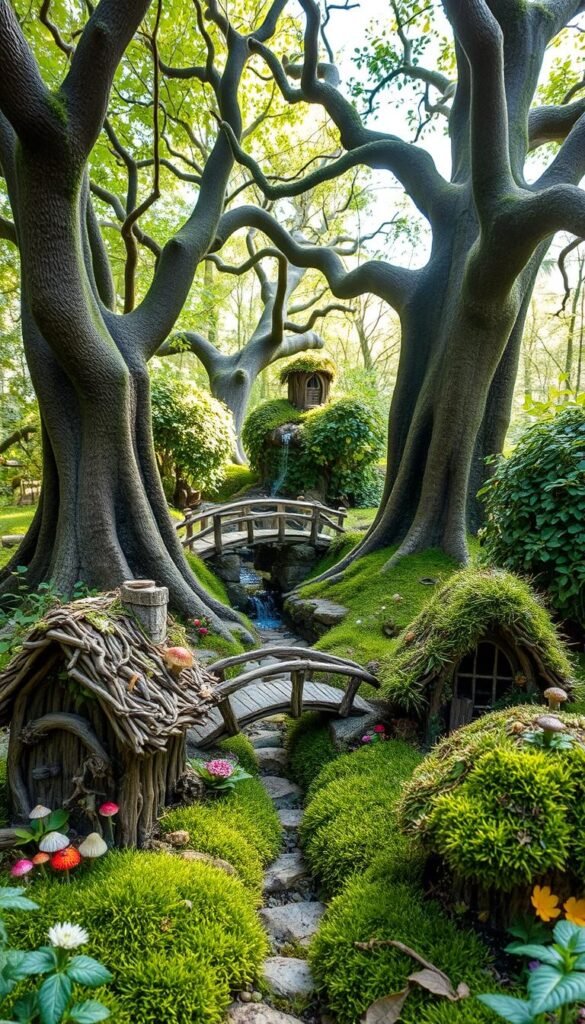
Unleash your inner architect by transforming humble materials into storybook dwellings. With craft sticks, recycled containers, and basic wooden items, you’ll build tiny worlds that spark curiosity at every turn.
Craft Stick Doors and Hobbit House Concepts
Turn ordinary craft sticks into whimsical portals using simple patterns. Create arched entryways by gluing sticks in semicircles, or design Dutch-style doors that appear half-open. For hobbit-inspired houses, wrap plastic bottles with brown sticks – the curved shape mimics cozy underground homes.
- Add “stained glass” using colored tissue paper behind stick windows
- Create textured roofs with layered popsicle sticks
- Use bottle caps as circular hobbit-style door handles
Transforming Wood Craft Birdhouses
Those $3 wooden birdhouses become fairy house masterpieces with moss roofs and pebble pathways. Remove the perch rod to create a proper doorway, then:
- Glue river rocks as foundation stones
- Attach twig shutters with miniature hinges
- Add a bark roof topped with dried flowers
For stone castle effects, coat recycled milk jugs with sand-textured grout. Build multi-level structures by stacking modified birdhouses, connecting them with twig ladders. Your DIY creations will blend seamlessly with natural surroundings while showcasing personal flair.
Creating Magical Pathways and Garden Accessories

Paths tell stories in miniature wonderlands. Let your walkways become narrative threads connecting hidden nooks and tiny landmarks. Start by gathering smooth stones from your yard or local creek – their natural shapes create organic curves perfect for winding trails.
Clothespins become storytellers when repurposed. Paint them with whimsical arrows pointing toward “Dragonfly Landing” or “Twilight Meadow.” These playful accessories add character while helping fairies navigate your creation.
Using Natural Stones, Pebbles, and Recycled Items
Hot glue transforms into liquid magic for crafting water features. Layer clear strands between pebbles to mimic cascading streams. Add blue glass beads at the base for shimmering pond effects that catch sunlight beautifully.
Pinecone scales make perfect roofing items. Attach them overlapping like shingles using waterproof glue. Broken terracotta pot pieces become rustic staircases when stacked – their weathered edges blend naturally with mossy slopes.
Mix textures for visual intrigue:
- Crushed walnut shells as sandy beach areas
- Bark chips as forest floor accents
- Sea glass fragments as mystical trail markers
These cottagecore charm techniques let you craft pathways that feel lived-in. Remember: uneven spacing between stones creates authentic, meandering routes that invite exploration.
Crafting a Fairytale Cottage Garden Ambiance
Imagine stepping into a living storybook where flowers whisper secrets and winding paths lead to hidden wonders. This whimsical style thrives on organized chaos – think billowing peonies brushing against foxglove spires, with daisies peeking through like curious spectators. Your space becomes a stage for nature’s drama, blending vibrant hues and textures that delight both humans and winged visitors.
Frame your garden entrance with climbing roses like ‘New Dawn,’ their blush-pink blooms forming natural archways. Pair them with white ‘Climbing Iceberg’ varieties for contrast, creating a floral tunnel that evolves daily. Beneath these arches, layer plants in staggered heights: tall foxgloves at the back, mid-sized peonies in the center, and cheerful daisies up front.
Curved pathways lined with thyme or moss invite exploration. Instead of straight lines, let walkways mimic meandering streams using irregular stones or repurposed bricks. Tuck miniature benches into corners surrounded by lavender or ferns – perfect spots for elevating your space into a sensory retreat.
| Season | Key Plants | Fairy Appeal |
|---|---|---|
| Spring | Peonies, Bleeding Hearts | Nectar-rich blooms |
| Summer | Daisies, Lavender | Pollinator magnets |
| Fall | Asters, Sedum | Seed heads for fairy crafts |
| Winter | Holly, Witch Hazel | Berry food sources |
Choose native species like milkweed and coneflowers to sustain butterflies while adding movement. Rotate seasonal accents – spring bulbs make way for summer’s zinnias, then autumn’s goldenrod. This ever-changing charm keeps your fairy realm alive with surprises, ensuring every visit feels like discovering a new chapter.
Illuminating Your Garden with Whimsical Lighting
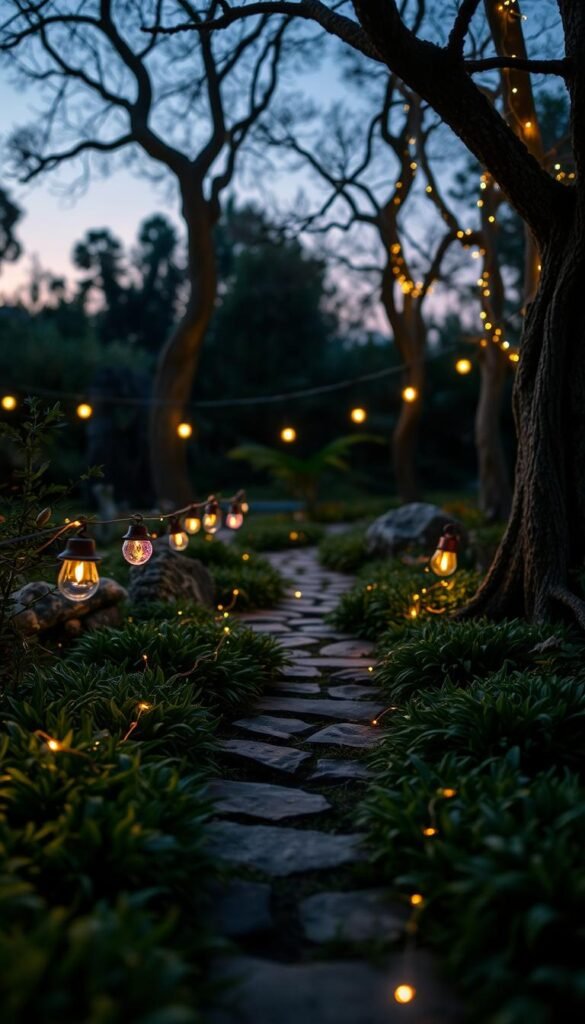
As twilight paints the sky, your miniature wonderland awakens with a new kind of magic. Strategic lighting transforms daytime charm into an after-dark spectacle where shadows dance and pathways glow. This evening metamorphosis invites both fireflies and human admirers to witness your enchanted realm in its full glory.
DIY Fairy Light Arrangements and Lantern Ideas
Upcycle mason jars into solar-powered cottages using waterproof paint and miniature hardware. Attach solar lids to create automatic lights that cast delicate patterns on pebble trails. For layered illumination:
- Drape warm-white string lights through tree branches
- Nestle tea-light lanterns among ferns
- Wrap wire LEDs around trellises
Thin LED strands become firefly simulations when wound through shrubs. Position them near water features to double their shimmer. “The right lighting doesn’t just reveal your creation – it tells a nighttime story,” notes a landscape designer specializing in miniature spaces.
Balance steady solar lamps with twinkling battery lights for depth. Use amber tones near seating areas and cool blues along pathways. Your garden becomes a 24-hour retreat where moonlit relaxation meets playful discovery.
Integrating Nature for a Truly Enchanting Space
Nature’s touch turns miniature worlds into believable fairy realms. By blending living greenery with artistic vision, you create habitats where mystical creatures might truly settle. This harmony between growth and design makes your creation feel alive – a space where petals become parasols and bark transforms into secret doorways.
Planting Strategies for Miniature Ecosystems
Start with fluffy blue ageratums – their pom-pom blooms mimic cloud formations at fairy scale. Pair them with blush-toned fairy roses, whose petite size matches miniature benches and cottages. These plants thrive in sunny spots, framing your tiny structures with vibrant color.
Moss works overtime in your enchanted garden. Press it into service as living carpeting for stone pathways or roof thatching for twig cottages. Its velvety texture suggests ancient woodlands while naturally retaining moisture for nearby plants.
Dwarf trees like Japanese maples add vertical interest without overwhelming the scene. Their seasonal color changes create dynamic backdrops – fiery autumn leaves make perfect fairy blankets. Underplant with creeping thyme to soften tree bases and release fragrance when stepped on.
- Create shade pockets with taller shrubs for delicate ferns
- Use sedum clusters as textured “meadows” between rocks
- Edge pathways with woolly thyme for fuzzy groundcover
Attract winged visitors by planting nectar-rich coneflowers and zinnias. Their bright blooms draw butterflies that appear giant in your tiny space, adding movement and life. This living ecosystem becomes self-sustaining – fairies would approve!
15 Creative Fairy Garden Ideas for a Magical Outdoor Retreat
Crafting tiny worlds invites endless possibilities where imagination takes root. Let’s explore final touches that turn ordinary spaces into storybook scenes bursting with personality.
Miniature Villages, Toadstools, and Art Shacks
Transform chipped ceramics into whimsical hubs. Position a sideways teacup as a cottage, its handle becoming a climbing vine trellis. Cluster twig teepees near painted bowl toadstools – their red-and-white spots pop against mossy bases. These playful elements create focal points that spark curiosity.
Innovative Use of Recycled Bottles and Containers
Turn clear plastic bottles into shimmering ponds by filling them with blue marbles. Cut milk jugs into curved benches, then coat them with weatherproof paint. Glass jars become glowing lanterns when wrapped in wire and hung from branches.
Your garden ideas thrive when mixing nature with repurposed treasures. Whether crafting a woodland scene or modern art shack, each idea adds unique charm. Now go plant magic where others see ordinary ground.

